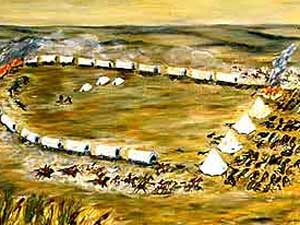|
Photos
More from MPR
Your Voice
|
"Loyal Mdewakantons" win land dispute
October 28, 2004
A federal judge has ruled in favor of 1,200 Minnesota Mdewakanton Dakota who say they have the right to three key parcels of land in the state. The contested land is currently occupied by three other tribal communities in Minnesota. The judge's ruling is centered on an 1886 agreement the plaintiffs contend the U.S. government made with their ancestors following the Dakota Conflict.
St. Paul, Minn. — Mdewakanton Chief Barbara Buttes told about 100 members of her community gathered at Historic Fort Snelling that the complex series of treaties and rulings all boils down to one key factor.
"The judge said that the land is ours!" Buttes said to the cheers of the crowd.
Buttes is the elected leader of a community of Native Americans who have proven ties back to the group of Mdewakanton Dakota who did not take part in the Dakota Conflict. In 1862, a group of Dakota took up arms against white settlers in retaliation for the U.S. government's role in breaking treaties.
 | |||
Butte's ancestors, and those of her communty, did not join in the fighting. Instead, this group of about 200 helped the white settlers during the bloodshed and were allowed to remain in Minnesota. In 1893 Congress appropriated about 80 acres to each member of the "loyal Mdewakantons."
The history of the land treaties skips ahead to 1980. At that time, the U.S. government contended the parcels of land in question were turned over to three tribal governments in Prairie Island, Shakopee and Redwood Falls. These tribal governments did not include the descendents of 200 original members of the "loyal Mdewakantons."
Ever since the fighting in the late 1800s, the members of this "loyal" group have been split from these tribes, and therefore have not benefited from the land.
The group has grown and now includes about 1,200 people. Group members say according to treaties, they are entitled to the land and all its benefits. Their attorney Erik Kaardal says this week's ruling upholds their assertion.
 | |||
"The judge said yesterday, from 1981 on, the United States has been in breach of its promises to you. The benefits of the land at Shakopee, Prairie Island and Lower Sioux go to you, exclusively and equally," says Kaardal. "This is a trail of tears -- there is great sorrow over this. Twenty-four years of misery while the people at Shakopee benefited at your expense."
The Shakopee land is the site of the popular and profitable Mystic Lake Casino. The judge's ruling could mean the 1,200 Minnesota Mdwakanton identified in the class action lawsuit could have a share in the casino's profits. Kaardal says the community members he represents have been poor and many do not have health care -- he calls that unfair.
"It's not right when they own this land and should be sharing in the benefits. The people at Shakopee have been receiving $900,000 per person per year to spend lavishly on themselves," Kaardal says.
There is no public record outlining what each band member receives in casino profits. All numbers are pure speculation. The Shakopee Mwewakanton, Prairie Island Indian Community and Lower Sioux Community near Redwood Falls have not returned calls for comment.
Kaardal says he's drafting a letter to Gov. Pawlenty to make sure his clients will be part of any casino revenue-sharing negociations involving the tribes and Minnesota state government officials.
But many members of the group says the issue goes beyond casino revenue sharing, and toward cultural issues. One of the lead plaintiffs in the case, Sheldon Peters Wolfchild, says he's been working on this lawsuit since 1997.
"This sets the stage for our children and their children for the next seven generations. They'll have their identity as Mdewakanton people for the first time since 1886," says Wolfchild.
Attorney Erik Kaardal says he predicts a lot of legal negotiating will take place between his clients and the leaders of the three affected tribes.
The next official step in the lawsuit occurs on Jan. 10, 2005. That's the deadline for the U.S. government to tell the federal judge if it's going to sue the three Native American tribes to get the money to pay damages to the 1,200 members of the Mdewakanton community.
|
News Headlines
|
Related Subjects
|

